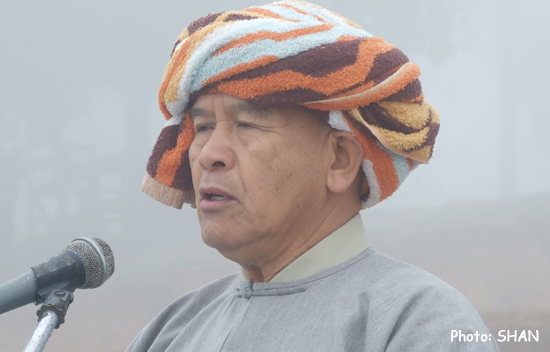In response to critics, bother former supporters and rivals alike, who say the movement’s leadership has gone naïve by entering a ceasefire pact with Naypyitaw, the Restoration Council of Shan State / Shan State Army (RCSS/SSA) argues the matter of trust, though important, is secondary.

“The world wants peace in Burma and our people want a respite from the endless conflict,” said 73 year old Sao Pai Mong, the RCSS/SSA’s principal adviser. “We know (by offering ceasefire talks and eventual political dialogue) the regime has challenged us to fight in the ring (and not outside it as it used to). By accepting the challenge, it doesn’t mean we have placed our fate in the regime’s hands.”
He cited several reasons why Naypyitaw especially the Tatmadaw (Armed Forces) could not be trusted: continued construction of fortifications, refusal to withdraw its troops to towns and cities, and continued harassment and attacks on the SSA, among others. “It shows they have only changed clothes but they still remain the same people,” he said.
Nevertheless, he believes Lt-Gen Yawdserk, leader of the SSA South, as the RCSS/SSA is commonly known, is correct in concluding a ceasefire agreement with President Thein Sein’s government. “You cannot win by staying outside the ring,” he reasoned. “And we believe in our leader’s ability to handle the problems that come with it. At the same time, he will need a lot of second line leaders who are as farsighted and share the same breadth of vision.”
He said the second phase of the peace process, as announced by U Aung Min, Naypyitaw’s chief negotiator on 19 November 2011, should focus on education and healthcare for the people and capacity-building for members of the movement.
Asked what he thought about President Thein Sein, he replied, “The Burmese leaders have a poor track record of getting rid of those who had performed outstanding services for the nation. Just look at the examples: Aung San after he won over the non-Burmans, Kyaw Zaw after he defeated the Kuomintang and Khin Nyunt after he achieved ceasefire agreements with several armed opposition movements. President Thein Sein certainly cannot afford to be careless.”
The RCSS/SSA signed the ceasefire agreement on 2 December and became one of the 7 major armed movements that are at an uneasy truce with the regime. The second agreement, signed on 16 January, has designated some 2,000 square kilometer area stretching along the Thai Burma border, opposite Maehongson and Chiangmai for resettlement and development. But the Burma Army so far has refused to implement it. Loi Taileng, the SSA South’s main base, is still conferring with Naypyitaw on how to go about it, said Yawdserk yesterday.


